BREAST CANCER TREATMENT: PAST, PRESENT AND THE FUTURE
By Dr. Prasenjit Chatterjee, Consultant Clinical Oncologist, Kolkata Despite a remarkable increase in the depth of our understanding and management of Breast Cancer in the past 50 years, the road to management and care is still

By Dr. Prasenjit Chatterjee, Consultant Clinical Oncologist, Kolkata
Despite a remarkable increase in the depth of our understanding and management of Breast Cancer in the past 50 years, the road to management and care is still long and winding posing significant challenges. However, in recent decades, the increased incidence of breast cancer has led to awareness and significant changes in diagnosis and treatment.
The earliest description of Breast Cancer dates to around 3500 BCE. For centuries thereafter the theories of the great Greek Physician like Hippocrates in 460 BCE and Galen in 200 BCE attributing the cause of Breast Cancer to an “excess of black bile” and treatment options like use of opium and castor oil, prevailed. The role of surgery was advocated around middle of 18th century and thereafter the advent of modern medicine in form of novel drugs and targeted therapies surfaced into clinical practice based on evidence.
The goal of any clinician is always administering the right treatment basis the prognosis which aids appropriate management. Management of Breast Cancer is multidisciplinary. It includes loco-regional which targets only the tumor with the help of surgery and radiation therapy) and systemic therapy approach that targets the entire body. The systemic therapy includes endocrine therapy for hormone receptor positive disease, chemotherapy, Anti Her2 therapy for Her2 positive disease, bone stabilizing agents, Polymerase inhibitors for BRCA mutation carriers and quite recently immunotherapy.
Further, clinicians are witnessing a shift towards tailored therapy as more targets are characterized and novel highly innovative approaches are developed. Apart this, Future therapeutic concept in Breast Cancer aims at personalized therapy as well as treatment de-escalation and escalation based on tumor biology and early therapy response. As the healthcare ecosystem is witnessing research and innovation in disease management, equal worldwide access to therapeutic advances remain a global challenge in Breast Cancer care for the future.
While we are all still grappling with COVID-19, the pandemic has posed a challenge to breast cancer patients who have been diagnosed with breast cancer. It has impacted their access to physicians, medications and surgeries. During this time, it is recommended for clinicians to schedule virtual sessions and in consultation with the patient and caregiver and ensure there is no over-crowding in case of face to face visit. Shorter duration of Radiotherapy with biological equivalent outcome, transient spacing of chemotherapy in metastatic breast cancer setting if deemed feasible, oral hormone therapy to delay surgery and judicious use of immunomodulators are some recent guidelines in evidence-based practice in this unprecedented crisis. Use of masks and sanitizer are necessary along with adhering to the government guidelines of social distancing.






